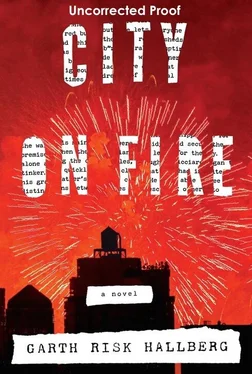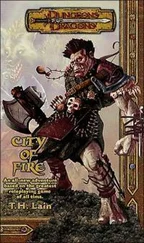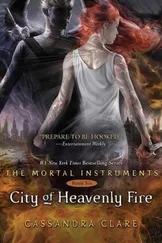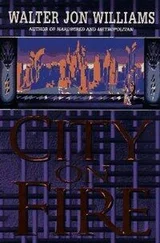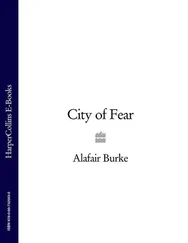“I have. I swear I have.”
“So here’s going to be our bargain—” and now, from somewhere within the mysterious creases of the notepad, a business card emerged. “Should anything else come back to you — I mean the smallest thing — you’re going to call me. Otherwise, I know where you live.” Mercer reached for the card. For a second, their fingers were in contact. “Now comes the part where you get the heck out of here.”
Pulaski let him get up, collect his coat, and move for the door, all the while pretending to be adding to his notes. He was halfway out the door when the guy said, as if to no one in particular, “You realize you may have saved a life tonight.” And it was funny, at this specific moment, this was exactly how Mercer felt about the little detective. Or inspector, really. DEPUTY INSPECTOR LAWRENCE J. PULASKI,the card said. And as he stood there, something was already coming back to him, something he might have told Pulaski, had he not suspected it would have kept him even longer. He’d thought for a moment someone had been watching in the park. Kneeling there in the snow — stupid as a pigeon, settling the beautiful overcoat over the twisted and now silent body whose smell would never leave him — he’d felt sure, for the briefest second, that he was not alone.
WIRES RACING ALONGthrough chords and triplets, swelling every so often into corroded connections, weird shapes against the sky, triangles and spheres like a coded message trying to tell him something. This morning, the whole mute breadth of Long Island was trying to tell him something: that he was a fucking coward, that he should have been back there with Sam, instead of here on this train, with the pajama bottoms on his unjeaned legs and this hat on his head so he looked like a fucking loon. Power transformers tilted up like weary crucifixes, shot through with rust and ice on the far side of a window he could see through only imperfectly, as he could remember the night only imperfectly. Condensation drew lines on the fogged parts of the glass, and beyond these lines, birds floated in a clearing sky, the gulls of Jamaica. Grasses sprouted from the snow like whiskers on a pale gray face. “Tickets,” the conductor said. “Tickets.” Under his breath, Charlie began to hum, both to calm himself down and because maybe that way the conductor would take him for an actual loon and pass him by. Keep your ’lectric eye on me, babe. Press your raygun to my head …
The truth was, he didn’t have a ticket. He’d spent the last few hours hiding out in the predawn freak show of Penn Station, trying to find a place far enough from tourists and hustlers and junkies and the odd baby-faced cop to safely crash. But he could feel hungry eyes sizing him up. I am a human being! he wanted to shout; Leave me alone! And when he did find a patch of floor upstairs in the deserted Amtrak waiting area, between two planters of sickly hostas, the last thing he felt capable of was sleep. The stench of the basement level reached him even here, like hot-dog water mixed with roofing tar and left in an alley to rot, and when he closed his eyes, a high-frequency white flashed against the normal, reassuring pink. That would have been some mixture of beer, schnapps, and panic. Because he had no idea where they’d taken her. How many hospitals were there in the City? With a phone book and a roll of dimes, he could have called them all. But even as every inward cell twitched and fluttered, outwardly he was comatose, curled on his side, with Grandpa’s hat cushioning his head and his pajama bottoms picking up stains from the tile and his size 14 combat boots trying to stay drawn up out of sight between the ugly stucco planters. And how dare he feel sorry for himself, when this could have been snow underneath him, or a stretcher, or …
He was trying to remember how to pray, Baruch atah, when he heard a cloud of disco somewhere nearby. He opened his eyes to see an aging black man dragging his custodial cart down the rows and rows of empty seats. They might have been the only two people on the Amtrak level at this hour, and the man affected not to see Charlie as he gathered yesterday’s newspapers from chairs and stuffed them into a trashbag. Most significantly, there was a transistor radio hooked to one leg of the cart. It was too early for morning papers to have been delivered to the station’s shuttered stands, but there was news every ten minutes at 1010 WINS, if Charlie could somehow get the radio retuned. If AM penetrated down here. With the man almost out of sight, Charlie stole after him. And when the cart vanished behind a column, Charlie hid on the other side. He kept close enough to hear the disco giving way to endless commercials, but the man never got more than ten feet away from the cart, and when he moved downstairs, the signal broke up. Charlie was still waiting for it to return an hour later when the departure board began to ripple with Saturday morning’s first trains. And so could he be blamed for having forgotten that his return ticket was back in the pocket of his jeans, in a bush in Central Park, and that he’d given his only money to a chick at a nightclub he shouldn’t have been in in the first place?
Nearer now, he heard the click of the conductor’s ticket punch, a tiny, elegant noise, like a beak stabbing at a tree. He dug in his jacket pocket and came up with a crumpled glove and a stick of Juicy Fruit gone brittle in its wrapper. And what if the conductor was onto him? What if they were searching all eastbound trains for a boy, 28 waist, 34 length, with missing pants? He didn’t want to call attention to himself, so he stopped humming. He had made up his mind — he owed it to Sam — to get home without getting caught.
Maybe it was a good thing, then, that there’d been no news of her yet. Because say she was at Bellevue, say some anchor had come on the radio between Wild Cherry and the Sunshine Band and said, like, Central Park shooting, trauma center, Bellevue; could he be certain he wouldn’t still be on this train, trying to escape, trying to convince himself that he could be more help to her if he was free, with no one knowing the whole thing was, indirectly, his fault?
He tried again to pray. He wasn’t sure for what — to go back in time, do things differently, make her get better? — and he’d thought, back at Penn Station, that this was the problem. But it wasn’t. Nor was the problem his nonexistent Hebrew, or the welter of distractions, the little hum of the train’s toy engine, the townships rattling past, the other passengers, the clickety-click of the conductor’s puncher; it was the silence behind all these, the answering silence. And maybe Charlie Weisbarger got no answer to his prayers because he didn’t know whom to address: the G-d of Mom and Dad, who had (though he did his best to forget it) plucked him from an orphanage when he was ten weeks old, or the intercessory Virgin to whom his biological ancestors had turned for help, or the long-haired, easygoing Jesus who was Just All Right with the Godspell kids at school …? Before he could arrive at an answer, the conductor was standing over him. “Tickets, please, all tickets.”
“I think I got on the wrong train,” he heard himself mumble, untruthfully. “Is this the Garden City?”
“This is the Oyster Bay, kid. Do you not listen to announcements?”
“I meant to go to Garden City.”
The conductor, a short man, was large of hand, impassive of face — it was a long shift — but wiry like the boy’s father had been. Adoptive father, Charlie forced himself to remember, yet the best and only one he’d ever known. “You’ll have to get off at the next stop, go back and transfer.”
Читать дальше
